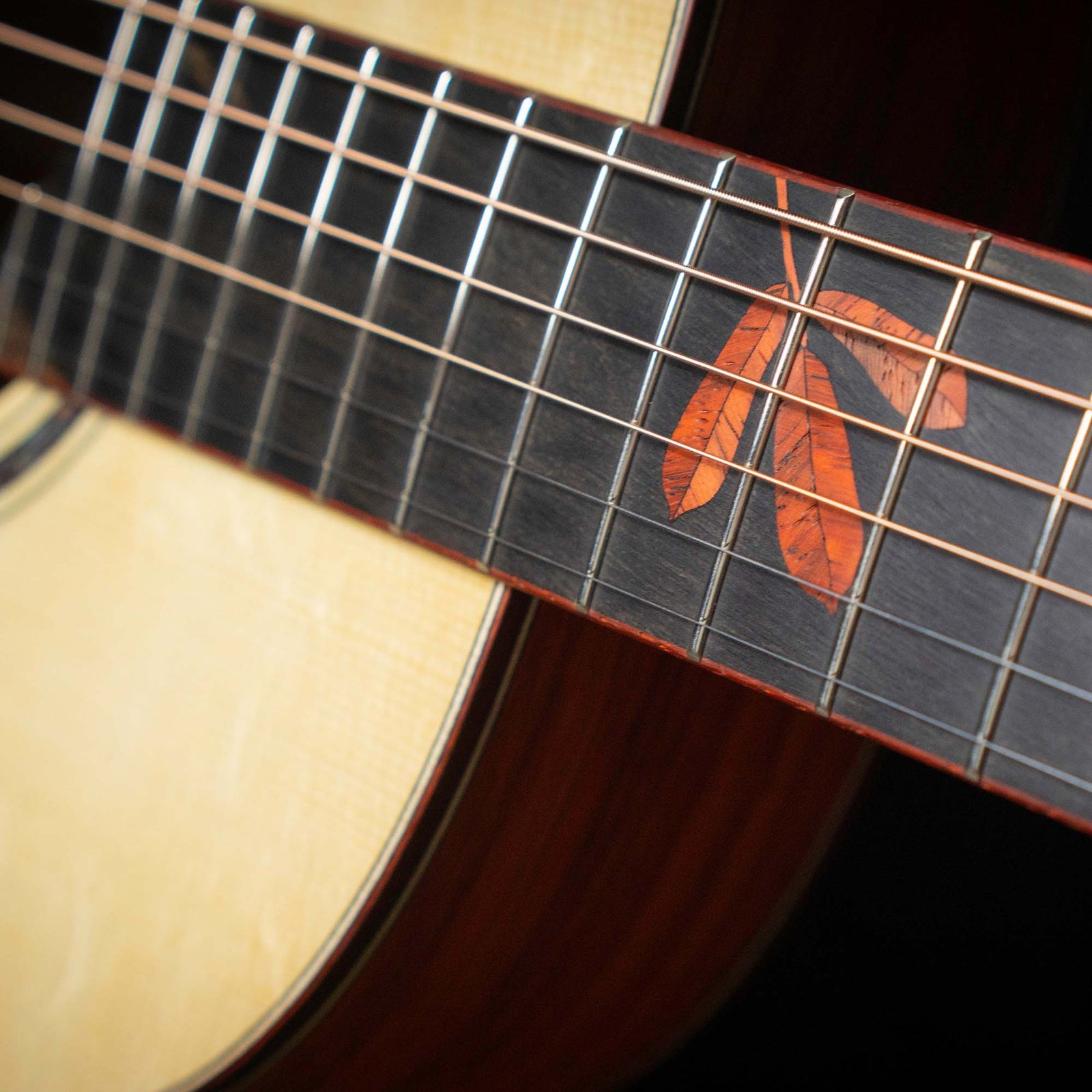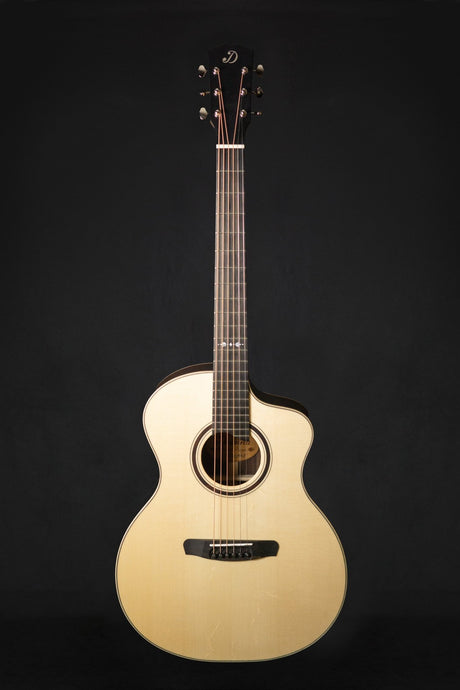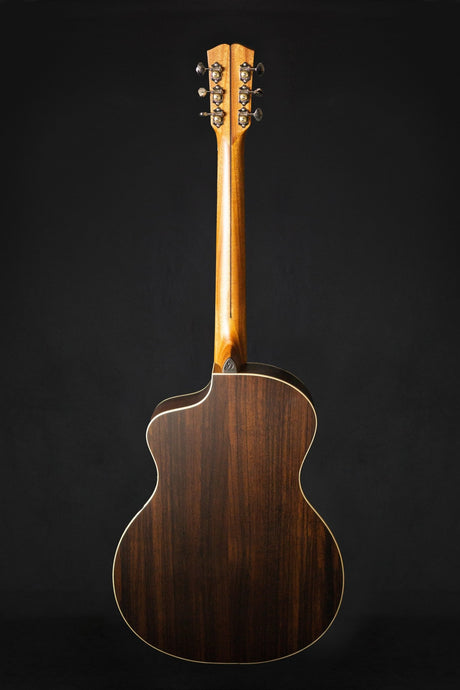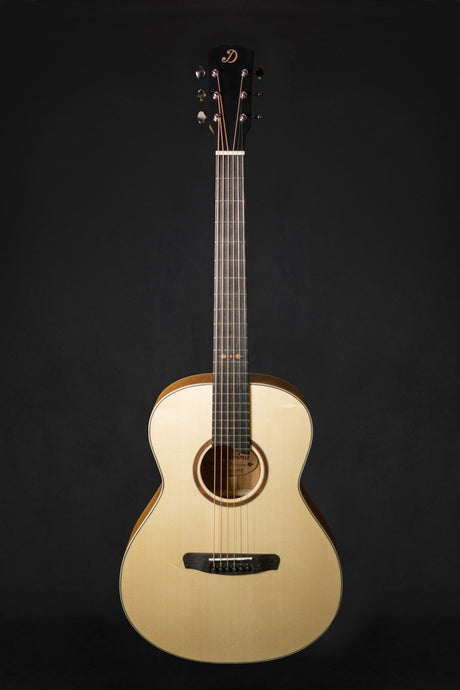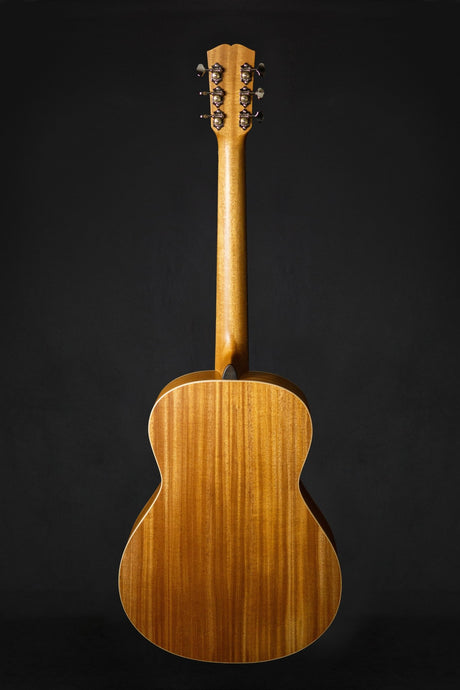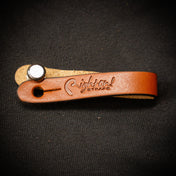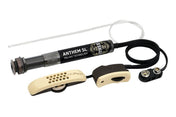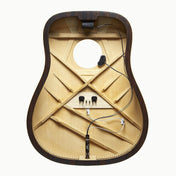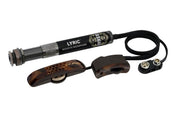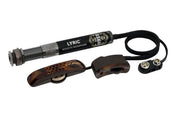Founded by Stan and Eirka, the father and daughter powerhouse. Dowina Guitars are family orientated with a huge passion for 'natural'. All things tonewood and letting the wood guide creativity into becoming what it wants to become.
So. In this blog post we will go through how Dowina make decisions about their wood choices, as well as tap tuning them and the passion behind their work.
Check out the video below for a bit of insight into how each one is lovingly created!
Firstly, wood choice.
Stan and Erika have both travelled across the world to find reputable wood suppliers that carry only FSC certified woods. This bit of legislation means that they are legally felled timbers that have been tracked from felling, milling all the way to the final sale. They don't just stick to your standard hardwoods. They do of course offer Khaya Mahogany, Indian Rosewood and so forth but they also offer a wide selection of more unique hardwoods for the guitar world. Things like Granadillo, Macauba, Purple Heart, Slovak Oak and many others.
The woods are chosen by hand by Stan and Erika themselves. They account for grain density, structure, tone/ring, humidity, colour and beauty. They only want the best woods to be used for their guitars.
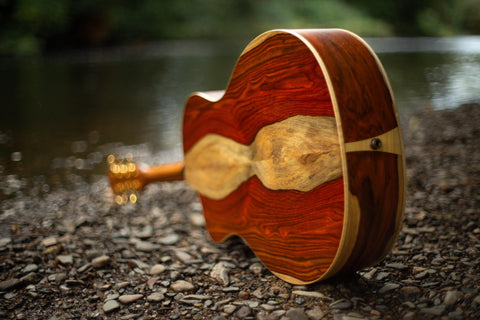
Secondly, building for the wood.
Dowina guitars don't just have the mentality of mass manufacturers. They have a small team of highly skilled luthiers building their guitars by hand with the help of machines. Rather than a big factory building with machines with the help of hands feeding the beast. The big difference here is that the Dowina team can feel the wood as its worked. The thickness will change from guitar to guitar to bring out the best of those woods. They never stick to the one formula. They ARE handmade through and through. This is what we call 'building for the wood'. The wood will guide the building process throughout each stage. Maybe the top wants to be 2.8mm thick rather than 3mm, Maybe the sides want to be thicker to help in the bending process, maybe the back wants to be thicker because the wood has a lower density. All of these things and many more are accounted for in this process.
These processes you normally only see on a luthier made instrument and I am happy to put Dowina in that category although they do have a small team and a small manufacturing facility. It's not just one person in a workshop. However the mentality is the same.

Thirdly, tap tuning.
Tap tuning is a process that most in the guitar world are unfamiliar with but if you play orchestral stringed instruments like violin, cello, double bass, etc you may already know of this process.
Before Stan launched Dowina guitars he was building just that. Beautiful orchestral stringed instruments. Thicknessing woods is a very particular job when it comes to these instruments as they are carved arches. You need to maintain certain thicknesses over certain areas. Not only this, but whilst building the plates and before it's glued together these plates are tapped and recorded using oscilloscopes. The oscilloscopes take a frequency reading and the wood is carved until the fundamental frequency is a clear note. Such as 'D' for instance. This is done for the top and the back. Sometimes with the back having a higher frequency than the top to aid in reflection and other times it's matched.
Having learnt this skill, once Dowina was launched, Stan made this a process within the Dowina line. All their instruments are 'Tap Tuned'.
So if it's tuned to 'D' for instance, that doesn't mean it's going to sound great in the key of D. It just means you have the correct thickness of wood so the vibrations travel in a uniform manner. Building great sounding guitars focuses massively on control of vibration and tension.
Tap tuning is purely vibrational control and gives the builder a great insight into how the guitar will sound before glueing the box together. They can also make critical changes before everything is glued together too which is invaluable in this process.
Not only is the back and top tuned to help them work in synergy but the bracing is the same. Once the bracing is glued down the back and top go back through this process and the bracing gets carved in unique ways to shape the tone and help the overall resonance. All whilst maintaining that fundamental frequency.
Each guitar is hand signed by the luthier who built it, the key in which it was tuned too and the luthier that did the tuning process. This is visable on the bracing whilst looking through the soundhole.
I could go on for ages in great depth but the above explanation covers all the basic understanding of this principle. In practice, a lot more goes into it.

Lastly, finishing.
Dowina are expanding their lines of finishes but for a long time they left everything open pore. The wood is telling them how it wants to be built. So if you're building guitars for the wood, why coat it in a toxic lacquer?
The open pore finishes and vintage semi gloss finishes are extremely organic and lets the wood shine. This ethos going straight from sourcing the woods until the finished product is just so apparent when you hold a Dowina for the first time.
They have an earthy, breathy tone that is perfectly balanced and truly heartwarming. The way they feel in the hands is inspired comparing them to other brands in this price point.
For an all solid, all handmade acoustic guitar built in Slovakia starting from £1199 it's not only an incredible price point but an instrument that you can be proud of. Something to inspire for years to come and an instrument that goes beyond the ideal of just owning another guitar. They become extensions of our very selves, our morality and our love for music.
The raw product is sourced with love, they are built with love, we sell them with love, to be cherished for many years to come.
Come and try them for yourself and I'm sure my expressions will become apparent from the moment of the first chord.
Written by
Ryan Havinga

